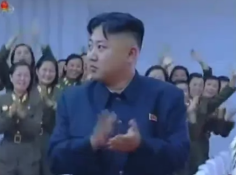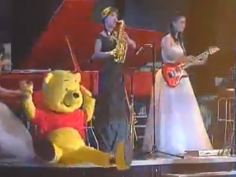
Moranbong style: North Korea's first girl band may be a sign of change
A year since their world debut, the musicians have been front and centre of Pyongyang cultural and political efforts
One year ago, North Korea's first all-girl band made its world debut.
The toe-tapping Moranbong had put on a performance that the secretive nation's state news agency called "unique, peculiar and modern".
One year on, Moranbong has come to represent a change in leadership style heralded by young dictator Kim Jong-un, who has been ruling the country's 24 million people since his father's death 19 months ago.

To play with such quality by memorizing the scores and without conductor and requires "very arduous and systematic training," said Shirley Cheung, a senior lecturer at Hong Kong's Vocational Training Council.
They "function as the living embodiment of Kim Jong-un's signature kind of Euro-lite culture that seems to be making its way into ruling circles", said Adam Cathcart, a long-time North Korea watcher and lecturer of Asian history at Queen's University in Belfast, Northern Ireland.
"Their sound definitely grows out of the state-sanctioned popular music and style" developed by two earlier state-sanctioned bands, the Poch'onbo Electronic Ensemble and the Wangjaesan band, said Donna Lee Kwon, an expert in ethnomusicology at the University of Kentucky. "Moranbong is significant in that it is a major addition to this very small group of ensembles that produce 'popular' music in North Korea."
"The songs are more or less similar to Chinese and Japanese pop songs of the 1980s," said Cheung. "It seems a bit disconnected to the trend of Asian pop music nowadays."

The dozen or so musicians are also in the spotlight at events that have clear foreign policy messages.

The girl band is named after the Moranbong district in the capital Pyongyang, the site of the Chinese embassy and where Kim's grandfather, Kim Il-sung, delivered his first speech after occupying Pyongyang.
The band's name is an incidental analogy to Gangam Syle. The name picked by South Korean K-Pop star Psy for his superhit last year refers to a hip district in Seoul, the southern capital.
For Kwon, the girl band is a sign of improvement in women's status in the repressive regime. "They are putting women front and centre in a new way, promoting a less conservative image of women," she said. "They are showcasing women as virtuosic instrumentalists who are extremely accomplished on their respective instruments."
But Cathcart warned against reading too much into the women's prominence.
"Putting women 'front and centre' doesn't mean [Pyongyang is] particularly progressive," he said. "There is a kind of uncomfortable mix of exuded North Korean-style sexiness along with obvious military boosterism."

